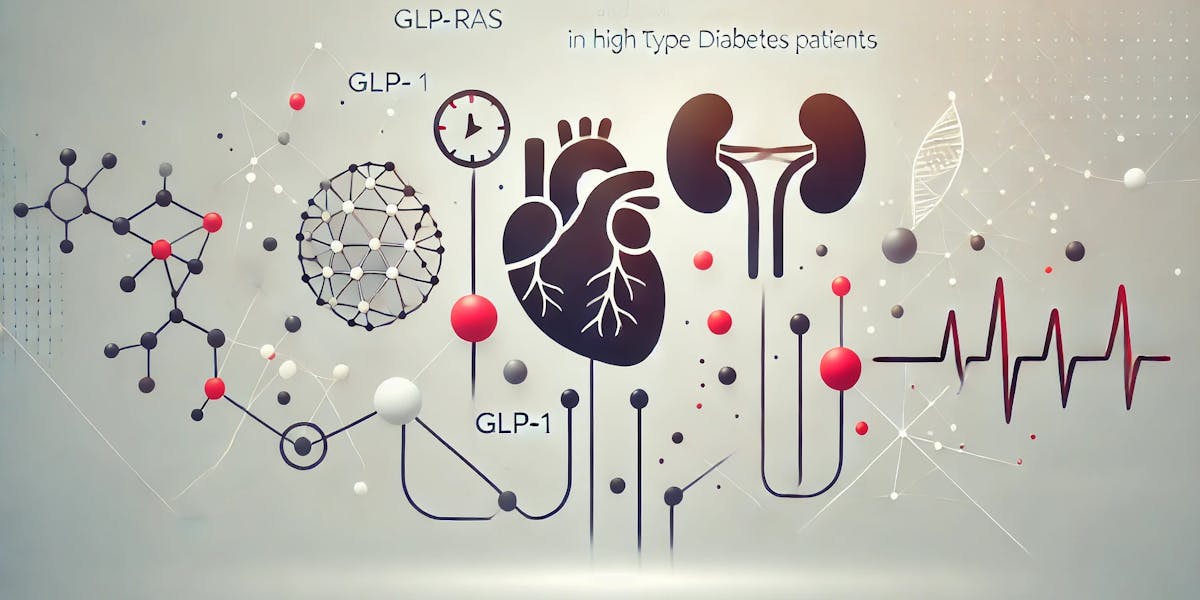GLP-1 RAs and Cardiovascular Risk in High-Risk T2DM Patients
Diabetology & Metabolic Syndrome

Summary
This study reveals that GLP-1 RAs significantly reduce cardiovascular risks in high-risk type 2 diabetes patients, particularly with combination therapy and in those with chronic kidney disease.
Study Design
Interventions
Study Type
Outcomes
Duration and Size
Study Population
Age Range
Sex
Geography
Other Criteria
Methodology
A systematic search of PubMed, Embase, Web of Science, and Cochrane Library was conducted to identify RCTs evaluating GLP-1 RAs in high-risk T2DM patients. Data were synthesized using a random-effects model and quality assessed via GRADE.
Interventions
GLP-1 RAs including albiglutide, dulaglutide, efpeglenatide, exenatide, liraglutide, lixisenatide, and semaglutide administered as monotherapy or with other glucose-lowering therapies.
Key Findings
GLP-1 RAs significantly reduce the risk of cardiovascular death, myocardial infarction, stroke, and heart failure hospitalization with the greatest benefit observed in combination therapy.
Comparison with other Studies
Compared to previous studies in lower-risk populations, this meta-analysis shows enhanced cardiovascular protection in high-risk subgroups, emphasizing the need for tailored treatments.
Journal Reference
Chen X, Zhang X, Xiang X, Fang X, Feng S. Effects of GLP-1 receptor agonists on cardiovascular outcomes in high-risk type 2 diabetes: a systematic review and meta-analysis. Diabetol Metab Syndr. 2024;16:251. doi:10.1186/s13098-024-01497-4.
Related and Discussions
GLP-1 Receptor Agonists for the Reduction of Atherosclerotic Cardiovascular Risk: A Pharmacologic Mechanism-Based Approach
Semaglutide and Cardiovascular Outcomes in Obesity without Diabetes
Clinical Outcomes of Tirzepatide or GLP-1 Receptor Agonists in Patients With Type 2 Diabetes
Novo Nordisk study finds that semaglutide (Wegovy) reduces risk of serious cardiovascular events
Effects of GLP-1 receptor agonists on kidney and cardiovascular disease outcomes
Cardiovascular, Mortality, and Kidney Outcomes with GLP-1 Receptor Agonists in Patients with Type 2 Diabetes: A Systematic Review and Meta-Analysis of Randomised Trials
Effects of GLP-1 Receptor Agonists on Cardiovascular Outcomes in Patients with Type 2 Diabetes and Chronic Kidney Disease: A Systematic Review and Meta-Analysis
Cardiovascular, Mortality, and Kidney Outcomes with GLP-1 Receptor Agonists in Patients with Type 2 Diabetes: A Systematic Review and Meta-Analysis of Cardiovascular Outcome Trials
Cardiovascular, Kidney, and Safety Outcomes with GLP-1 Receptor Agonists: A Systematic Review and Meta-Analysis of Randomized Placebo-Controlled Trials
Effects of GLP-1 Receptor Agonists on Cardiovascular Outcomes in Patients with Type 2 Diabetes: A Meta-Analysis of Randomized Placebo-Controlled Trials
Effects of GLP-1 receptor agonists on kidney and cardiovascular disease outcomes: a meta-analysis of randomised controlled trials
GLP-1 receptor agonists may reduce the risk of heart failure hospitalization, mortality, and cardiovascular outcomes, even in individuals without diabetes.
New study out today: GLP-1 agonists (e.g., Ozempic) reduced heart attack rates & other health problems in obese people without diabetes.
A review of 3 trials in persons with type 2 diabetes demonstrated consistent cardiovascular and kidney benefits of GLP-1 receptor agonists.
We found evidence that GLP-1 receptor agonists significantly reduce clinically important kidney events, kidney failure, and cardiovascular events.
Optimizing Cardiovascular, Renal Prognosis in Diabetes with GLP-1 RAs
Stay informed. Stay ahead.
Subscribe now for the latest breakthroughs, expert insights, and cutting-edge updates in diabetes care—delivered straight to your inbox.